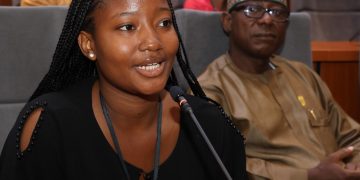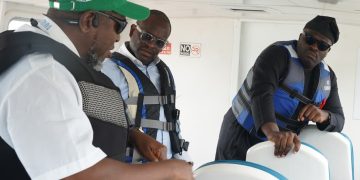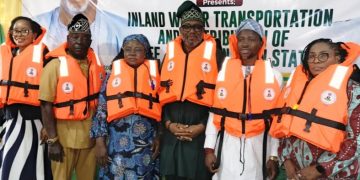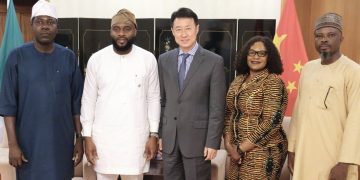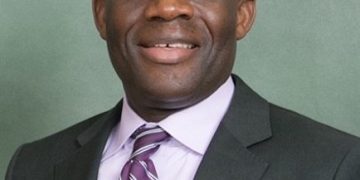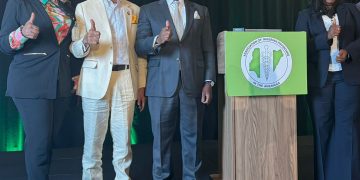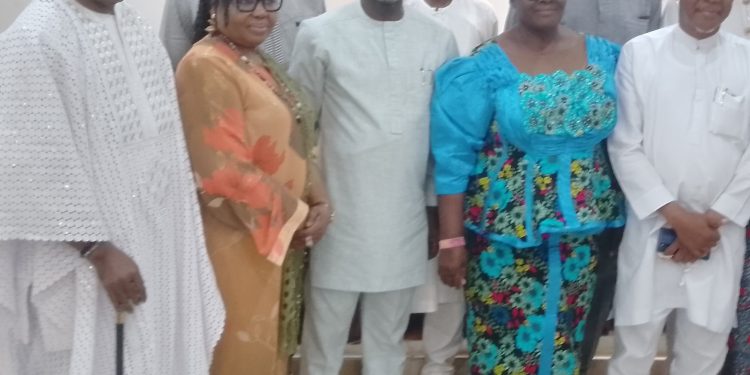- Director, Strategic Planning and Research, Nigerian Shippers’ Council, Rotimi Anifowoshe (middle, front row, representing the NSC Executive Secretary and chairman of occasion, Mr. Pius Akutah), flanked by the Ag. Head, Corporate and Strategic Communications, Nigerian Ports Authority, Sarah Ballah (second left), new President of LOMEP, Remi Itie (second right), other stakeholders and some members of the association’s new executive committee after their swearing-in during their Annual General Meeting/Seminar in Lagos…Friday
By Anthony Nwachukwu
The Minister of Marine and Blue Economy, Adegboyega Oyetola, has called on the maritime media practitioners to partner the ministry and help showcase and promote the potentials of the country’s blue economy sector to Nigerians and the world for the needed investments and national economic growth.
“I encourage you to continue highlighting the opportunities in this space, showcasing successes, and ensuring that public and private stakeholders are held accountable. Your role in informing and educating the public will be key to unlocking the full potentials of the blue economy,” he stated.
Oyetola, who spoke on “Renewed Hope Agenda: The Place of Nigeria’s Maritime Industry/Challenges of Customs Revenue Generation/Anti-Smuggling Operations” as theme of the 13th League of Maritime Editors and Publishers (LOMEP) AGM/Seminar in Lagos Friday, noted that the need to harness the sector’s vast untapped potentials and economic possibilities prompted the carving out of a separate ministry for it.
Represented by the ministry’s Director, Maritime Services, Oyetola said “the maritime industry has the potential to transform Nigeria’s economy, create jobs, and improve livelihoods. With our rich coastline and strategic location, the country is well positioned to become a key hub for maritime activities in Africa.
“The creation of this ministry, therefore, reflects government’s commitment to building a future where the blue economy plays a major role in national prosperity. In bringing this vision to life, we are working to reposition the sector by improving port efficiency, enhancing infrastructure, boosting maritime security, and developing the workforce.
“Additionally, we aim to sustainably leverage maritime resources to create jobs, increase revenue, and promote environmental stewardship.”
To these ends, Oyetola solicited the maritime media support in achieving these, as their role “in shaping public perception and highlighting critical issues is very essential. Through your platforms, you can showcase the maritime sector’s potentials and its benefits to all Nigerians.”
He further commended LOMEP’s efforts in bringing attention to the sector’s challenges and opportunities, which have “raised awareness of the blue economy’s vast possibilities,” while soliciting their continued support to portray the sector as a transformative force in Nigeria’s economy.
“Please stay engaged in reporting on maritime reforms and initiatives. We are committed to providing accurate information and supporting your efforts to keep the public informed,” he stated.
“We rely on you to emphasise the maritime sector’s vast potentials and amplify the message that it can significantly boost our GDP, create millions of jobs, and open new avenues for investment and innovation. This can only be achieved if the sector receives the required attention, support, commitment and involvement of all Nigerians.
“Let me state that the ministry is committed to collaborating with all stakeholders, particularly the media, to foster a globally competitive and sustainable maritime industry.
Earlier, the outgoing President of LOMEP, Timothy Okorocha, had flayed the chief executives of the regulatory agencies in the maritime industry for always trivialising invitation to participate in media-organised events over flimsy excuses.
He regretted that while the maritime journalists readily cover the media activities of these respective organisations, they in reverse always shun media groups’ invitations even though “these workshops and conferences are industry-tailored and directly linked to their operations and services.
Meanwhile, he urged participants to sincerely appraise the key dynamics propelling the industry so far under the Ministry of Marine Blue Economy, against the federal government’s perceived failure to provide a blueprint to serve as necessary guide “for informed references, assessments and empirical, statistical data.
“We believe that there can be no purposeful planning and implementation of sectoral activities of the scale of the blue economy without effective monitoring tools with a well laid-out trajectory and framework.”

